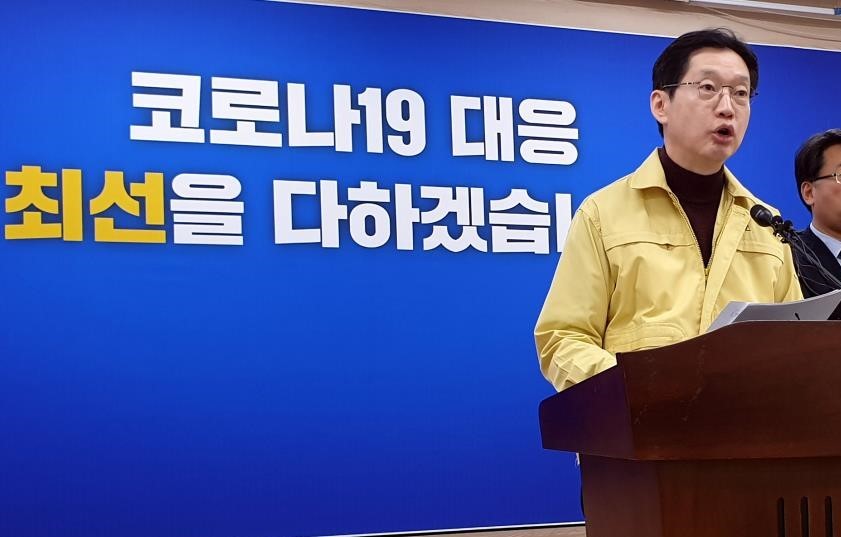[Newsmaker] Basic income scheme of W51tr spurs controversy
Will cash transfer to citizens for tackling COVID-19 get Korea’s economy back on track?
By Jung Min-kyungPublished : March 10, 2020 - 15:03

With the novel coronavirus outbreak dealing a major blow to South Korea’s economy, a far-reaching welfare measure to give every citizen 1 million won ($839,00) is igniting a heated debate.
Suggested as a temporary scheme, primarily designed to support citizens financially crippled by the rapid spread of COVID-19, politicians and liberal-leaning opinion leaders claim it could also stimulate the sluggish economy.
There are mixed responses, with some questioning who the beneficiaries should be, the soundness of the national finances, and the motive behind the scheme, which has been announced just a month ahead of the general election.
The so-called “basic income under disastrous circumstances,” is literally a special welfare measure -- a government program for periodic payments to citizens without any real basis.
Politicians are suggesting a temporary, or one-time version, of the program under the current epidemic. But it would cost 51 trillion won every time the government disburses 1 million won to citizens. The budget is huge, already five times more than the extra budget to overcome this unprecedented epidemic situation, and one-tenth of South Korea‘s annual budget of 512.3 trillion won.
Advocates of scheme
Politicians backing the scheme include heads of local governments -- Seoul Mayor Park Won-soon, Gyeonggi Province Gov. Lee Jae-myung and South Gyeongsang Gov. Kim Kyung-soo -- largely supported by liberal voters and young people.
The main opposition United Future Party, the minor Justice Party and even some lawmakers from the ruling Democratic Party have joined the political bandwagon.
But there were noteworthy differences between the plans, including the suggested amount of the basic income, which ranges from a minimum of 300,000 won ($249.69) to 1 million won per person or household.
The potential recipients vary as well. Kim claimed that all citizens must be allowed to receive equal support of 1 million won each. By providing half of the money in cash and the rest in vouchers designed to support local businesses with a six-month expiration period, the program will help invigorate regional economies, the South Gyeongsang Province government added in a statement.
Park on Tuesday proposed to the government to support his plan of handing a total of 600,000 won per household to support their expenses from February to March period. Around 8 million poorer households are subject to the proposal.
Political parties such as the United Future Party said 500,000 won each should be provided to 2 million households in need, while the Justice Party said the money should go to residents in Daegu and neighboring North Gyeongsang Province, which are the epicenters of the viral outbreaks.
Surprisingly, the scheme was raised first by a nonpolitical figure.
Lee Jae-woong, CEO of a local car-sharing app operator SoCar posted a petition on the Cheong Wa Dae website on March 1, saying that 10 million small business and irregular workers should be recipients of the program. They should each receive 500,000 won worth of support, he suggested.
Will it work?
Despite the media frenzy over the plan, economists are skeptical. The idea of gifting cash from the national budget will not help invigorate the economy, they said.

“The program could be inefficient because it means the government is spending its budget outside its regular expenditure, resulting in a higher fiscal multiplier,” said Kim So-young, an economics professor at Seoul National University, indicating it could put unnecessary pressure on the government.
“It holds the risk of increasing national debt without any positive results,” she added.
Some others are also concerned that politicians are using the concept of basic income to attract populist votes ahead of the upcoming general election on April 15.
“The scheme is a result of the government’s efforts to simplify its fiscal programs to mask its policy failures,” Cho Joon-mo, economics professor at Sungkyunkwan University said.
“The basic income scheme under disastrous situations only highlights the benefits of the original basic income program without taking government responsibility into account.”
Finance Minister and Deputy Prime Minister Hong Nam-ki echoed the skeptics on Tuesday saying that it is “difficult to agree” to the basic income proposals.
“The government has so far rolled out fiscal measures worth 32 trillion won including the latest extra budget bill,” Hong said at a parliamentary meeting.
“It is difficult to provide (separate) financial supports for the self-employed in terms of both logic and quantity,” he added.
Adding more to the government’s extra budget bill worth more than 10 trillion won -- already submitted to the National Assembly earlier this month -- is taking a big risk, Hong hinted.
The extra budget bill includes a plan involving coupons worth a combined 2 trillion won for 5 million citizens financially hit by the coronavirus outbreak. A total of 3 trillion won has been set aside for citizen and job market support.
The budget is already larger than the amount of fiscal spending included in the 2015 extra budget to cope with the MERS outbreak, according to Finance Minister Hong Nam-ki.
The possibility that the idea will be submitted to the parliament appears to be low in any case, with some conservative and ruling party politicians citing time constraints.
“We cannot delay schedules concerning the extra budget bill because of the basic income under disaster program and the purpose of the income plan is already reflected in the bill,” said Kang Hoon-sik, chief spokesman of the Democratic Party.
By Jung Min-kyung (mkjung@heraldcorp.com)










![[From the Scene] Monks, Buddhists hail return of remains of Buddhas](http://res.heraldm.com/phpwas/restmb_idxmake.php?idx=644&simg=/content/image/2024/04/19/20240419050617_0.jpg&u=20240419175937)




![[From the Scene] Monks, Buddhists hail return of remains of Buddhas](http://res.heraldm.com/phpwas/restmb_idxmake.php?idx=652&simg=/content/image/2024/04/19/20240419050617_0.jpg&u=20240419175937)

![[KH Explains] Hyundai's full hybrid edge to pay off amid slow transition to pure EVs](http://res.heraldm.com/phpwas/restmb_idxmake.php?idx=652&simg=/content/image/2024/04/18/20240418050645_0.jpg&u=20240419100350)

![[Today’s K-pop] Illit drops debut single remix](http://res.heraldm.com/phpwas/restmb_idxmake.php?idx=642&simg=/content/image/2024/04/19/20240419050612_0.jpg&u=)